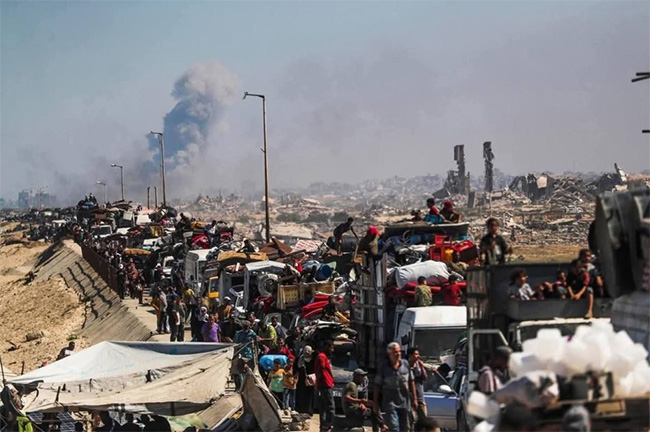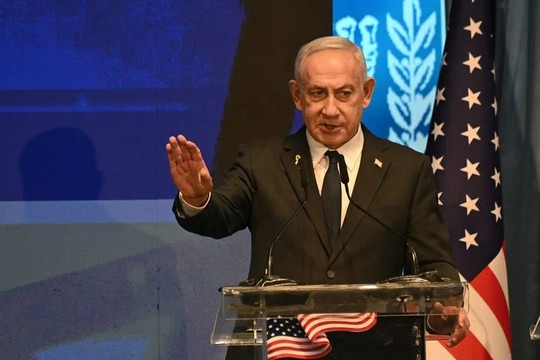Israeli PM Netanyahu speaks in Jerusalem.
Photo: Reuters
Prime Minister Benjamin Netanyahu warned Monday that Israel may soon be forced to adopt what he described as an economy with “autarkic features” resembling a “super-Sparta,” as mounting international pressure and restrictions threaten the country’s access to global trade and weapons imports.
Speaking at the Accountant General’s Conference in Jerusalem, Netanyahu said Israel faces a “new and challenging diplomatic reality” driven in part by demographic and technological shifts abroad.
He argued that Muslim migration to Europe has created a “significant and vocal minority” that bends European governments on issues related to Gaza. “They deny Zionism,” Netanyahu said, adding that this influence was fueling sanctions and restrictions against Israel and limiting its ability to import key weapons components.
In unusually blunt remarks, Netanyahu said these trends are pushing Israel toward partial economic self-reliance. “We will increasingly have to adapt to an economy with autarkic features,” he said. “It’s a word I dislike — I believe in free markets, I worked to bring Israel a free-market revolution. But we may find ourselves in a situation where our defense industries are blocked. We will have to develop indigenous defense industries. We will have to become Athens and super-Sparta. We have no choice. At least in the coming years, we will have to deal with these attempts at isolation. What worked until now will not work from now on.”
Netanyahu also blamed the digital revolution for accelerating Israel’s isolation. “Our rivals exploit it. China and Qatar are investing massive sums in artificial intelligence, and they have more power than legacy media. And legacy media joins the international minorities. This pushes us into isolation. We will have to fight it,” he said.
Though he has typically spoken in vague terms about Qatar since the eruption of the so-called “Qatargate affair” — in which some of his close associates are accused of accepting payments from the Qatari government to promote Doha’s interests — Netanyahu was more explicit Monday, saying that “enemy states, including Qatar, have invested vast sums to influence global discourse through social networks. This pushes us into a kind of isolation.”
Earlier Monday, eighty of Israel’s most senior economists warned that a full-scale invasion and military occupation of Gaza would cause unprecedented economic harm to the country, deepening an already severe crisis caused by the ongoing war.
In a letter obtained by Ynet, the economists said the government’s plan to capture Gaza City and displace about one million people in a months-long military operation would lead to an exodus of young professionals, long-term damage to Israel’s international standing and devastating effects on its economy and society.
 Gaza today. Israeli forces destroyed at least 30 residential buildings in Gaza City and forced thousands of people from their homes, Palestinian officials said.
Gaza today. Israeli forces destroyed at least 30 residential buildings in Gaza City and forced thousands of people from their homes, Palestinian officials said.
Photo: Reuters
Netanyahu’s statements mark a rare acknowledgement of the massive international backlash Israel faces as it escalates its war in Gaza, CNN notes. He has refused to change course, despite warnings from the United Nations and others that a looming assault on Gaza City will lead to more death and destruction, and amid mounting accusations that Israel is committing genocide in the enclave, which Israel strongly denies.
Israel now faces partial or complete arms embargoes from France, the Netherlands, the UK, Spain, Italy and others due to its conduct in the Gaza war. The majority of its weapons imports however, come from the United States, which hasn’t placed any such restrictions – and has warned others from doing so. A Biden-era delay on a shipment of 2,000-pound bombs was quickly lifted by the Trump administration.
The Israeli public, hostage families, and even the military have opposed expanding the war over concerns it could endanger the hostages and worsen the humanitarian toll. But the prime minister has insisted on pressing ahead.
For years, Israel has been considered an economic powerhouse regionally and globally, driven in large part by its vaunted high-tech industry. But the war has had an economic impact and is already the longest and most expensive in the country’s history.
Netanyahu partly attributed the isolation to “an extreme Islamist agenda” which he claimed had a “very negative influence” on European foreign policy. He also said rival states – “among them Qatar” – have shaped global discourse on social media, which “puts us into a kind of isolation.”
“This situation threatens us with the beginnings of economic sanctions and problems importing weapons and weapon parts,” Netanyahu said.
‘There will be no second chance’
Israeli opposition leader Yair Lapid slammed Netanyahu in response, dubbing his statement that Israel is entering isolation as “crazy.”
Gadi Eisenkot, the former Israeli military chief planning a political run, also blasted the prime minister, saying, “There will be no second chance to repair the damage caused by him and his partners who abandoned the hostages and isolated Israel in the world.”
read more in our Telegram-channel https://t.me/The_International_Affairs

 11:26 17.09.2025 •
11:26 17.09.2025 •























